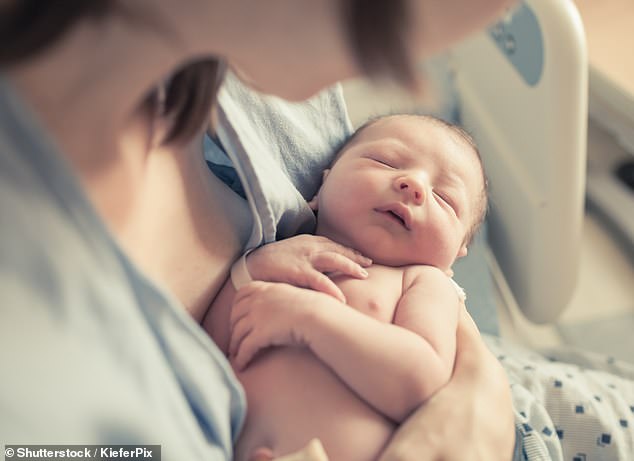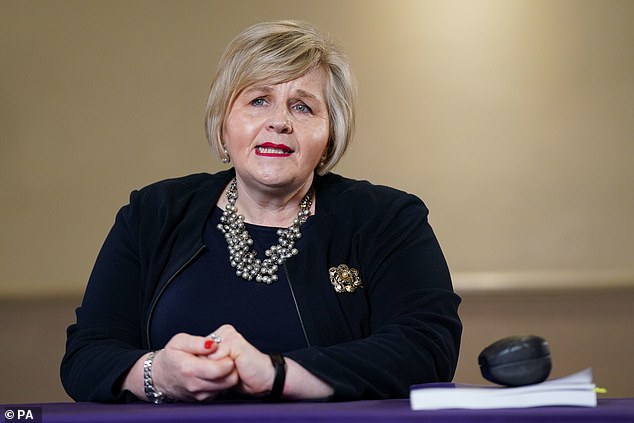‘This could have catastrophic consequences’: Patient safety experts slam Green Party maternity policy that promises to make childbirth a ‘non-medical event’ and labels life-saving C-sections ‘risky’
The Green Party has come under fire for claiming that childbirth should be treated as a ‘non-medical event’ and for calling life-saving caesarean sections ‘risky’ in its maternity policy.
Among its election promises, the party claims it will ‘work to reduce the number of childbirth interventions’ and highlights the party’s concerns about falling rates of ‘natural’ births.
The proposals, which have since been removed from the party’s website but are still circulating on social media, have been branded ‘archaic’ and ‘disappointing’ by doctors.
Meanwhile, patient safety experts have warned that a lack of intervention in childbirth could have ‘catastrophic consequences’.
It comes after the Greens’ bizarre plans to have crack cocaine and date rape drug GHB dispensed by pharmacists in a bid to combat the rising tide of addiction – a move that experts say could lead to more drug abuse, rather than fewer.
The Green Party called caesarean sections ‘risky’ in its policy, which doctors called ‘archaic’

Patient safety experts and midwives have warned that there is evidence that a lack of intervention in childbirth causes more harm
The Greens website read yesterday: ‘The incidence of medical interventions in childbirth has escalated in recent years, especially the number of caesarean sections, which are expensive and, if not medically necessary, risky.
‘We will work to reduce the number of childbirth interventions and change the culture of childbirth NHS so that birth is treated as a normal and non-medical event, in which mothers have power and can exercise control.”
It also states that ‘all women should be entitled to the highest standards of care during pregnancy, birth and postnatally’ and further suggests that women should be offered ‘appropriate’ choices.
The policy states: ‘We will ensure that women get the information they need to make the right choices about how they want to give birth, and that a full range of options are made available, including home birth and a range of styles of birth. delivery in hospital. available to all women.’
Patient safety advocate and campaigner James Titcombe said he was “shocked” when he read the document and suggested the party speak to families affected by poor maternity care.
He told MailOnline: ‘Whoever drafted the policy would do well to study the history of maternity care in this country and in particular speak to some of the families whose lives have been devastated as a result of previous national policy initiatives aimed at promoting so-called ‘normal’ or ‘natural’ birth.’
Mr Titcombe, whose son Joshua was one of several babies to die in what would become known as the Morecambe Bay pregnancy scandal, stressed that ‘life-changing complications can develop very quickly’ and that ‘safe maternity care is only possible if the focus is on anticipating problems’, including ‘intervening where necessary’.
“Pressure from above to reduce caesarean sections or maternity care, where one type of birth is seen as superior to the other, could have catastrophic consequences for women, babies and families,” Mr Titcombe added.
Rebecca Matthews, a lecturer and psychology student at Oxford Brookes, expressed her “disappointment” with the social media policy.
She wrote on X: ‘Haven’t you read the reports about recent pregnancy scandals? Lack of intervention contributes to so much avoidable harm.”
She added: ‘(The policy) feels like an attack on bodily autonomy, we should be able to choose a caesarean section. Recent evidence shows that a planned caesarean section is safer than a planned vaginal delivery.’
NHS anesthetist, Gem of @summonsy on X, also said she was ‘outraged’ when she saw the policy.
She said: ‘It’s actually a very archaic position for a party that claims to be progressive.’
Donna Ockenden, an experienced midwife who is currently leading an investigation into poor maternity care in Nottingham, responded to Ms Matthews’ post and suggested the Green Party read her report.
She said: ‘I am very happy to discuss safe maternity care with anyone from any political party: the first point of call for the Green Party would be to read out the Ockenden assessment reports in Shrewsbury and Telford.’
She added: ‘Surely safe maternity care should be understood by everyone? It is a critical, cross-party issue that affects women, babies and families across the country.”
Some 201 babies and nine mothers died needlessly during a 20-year period at Shrewsbury and Telford Hospital NHS Trust, it was revealed in 2022.

Donna Ockenden, an experienced midwife who is currently leading an inquiry into poor maternity care in Nottingham, suggested the Green Party read her report
In a landmark 250-page report led by Ms Ockenden, researchers investigating the failures cited an obsession with “normal births”.
Women were encouraged to have vaginal deliveries, often when a caesarean section would have been a safer option, to keep the number of operations down.
The 2015 Morecambe Bay also referred to the dangers of fixating on natural or ‘normal’ births.
Eleven babies were diagnosed and one mother had died from preventable deaths. It was ruled that a group of midwives overzealously pursued natural childbirth and that ‘sometimes led to inappropriate and unsafe care’.
The idea of a ‘normal birth’ has been widely promoted by respected bodies.
But the Royal College of Midwives formally stopped its ‘normal birth’ campaign in 2017, after previously praising trusts for keeping caesarean rates low.
In the wake of the Shrewsbury report, several women told how they felt pressured not to have a caesarean section.
One of these was MP Anne-Marie Trevelyan, who revealed in 2022 that she was “told I wouldn’t have a caesarean section” during the difficult birth of her first child.
Recalling her experience, she told LBC that after her son was born she realized it was ‘ridiculous’ that she had not undergone the procedure and that she ‘absolutely’ should have done so.
Mrs Trevelyan added that she was left ‘very damaged’, but thankfully her son was doing well.
The number of caesarean sections has been increasing for years, a trend that is partly explained by increasing obesity.
Some studies have shown that being overweight during pregnancy increases the likelihood that the intervention will be needed.
Pregnant women in their late 30s and 40s, who make up an increasing proportion of mothers, are also more likely to require a caesarean section due to the increased risk of complications.
